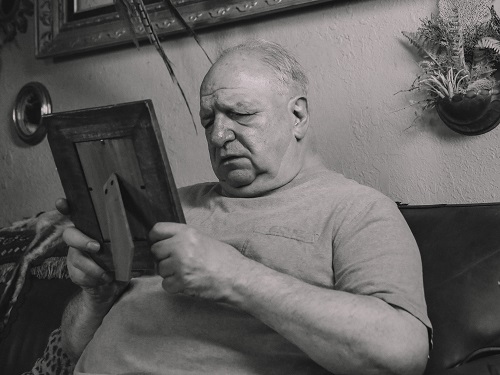Contents
Dementia is not a particular disease but symptoms affecting memory, ability to think, make decisions and social interaction abilities. Generally, dementia affects older adults but is not a part of the normal ageing process. One with dementia will find a decline in memory, reasoning ability, coordination, mood and behaviour.
Dementia symptoms
Dementia symptoms vary on the reason behind the disorder. Common dementia symptoms include cognitive changes and psychological changes.
Cognitive changes – Dementia symptoms

•Memory loss
•Difficulty in communication
•Difficulty in finding words
•Problems with visual and spatial abilities – such as getting lost while driving
•The reasoning or problem-solving becomes difficult.
•Difficulty handling complex tasks
•Difficulty with planning and organizing
•Coordination and motor functions problems.
•Confusion and disorientation
Psychological changes – Dementia symptoms
•Personality changes
•Inappropriate behaviour
•Paranoia
•Agitation
•Hallucinations
Early Dementia symptoms are as of below:
•One needs help remembering current recent events.
•Forgetting information
•Repeating similar phrases over a brief period.
•Misplacing common items.
•Forgetting month, year, season etc.
•Difficulty finding the right words during a conversation.
•Change in mood or behaviour.
Dementia symptoms which determine that dementia is getting worse include:
•Declination in the ability to remember.
•Difficulty in decision-making.
•Difficulty finding the right words during conversation increases.
•Daily simple tasks like brushing teeth, making breakfast etc. more difficult.
•Rational thinking and problem-solving ability further declines.
•Change in sleeping pattern.
•Increases in anxiety, confusion, agitation, suspiciousness, and depression.
•Daily activities such as grooming, toileting, bathing and eating need help.
•Increased hallucinations.
These are some general dementia symptoms. The dementia symptoms differ with different people and depend on what area of their brain is affected. Additional signs and unusual symptoms occur with specific types of dementia.
Different types of dementia
There are different types of dementia. Several factors and many disorders are behind the development of dementia. Dementias can be broadly classified into three groups:
1. Primary dementia – types of dementia
2. Secondary dementia – types of dementia
3. Reversible dementia – types of dementia like symptoms caused by other illnesses or causes
1. Primary Dementia-Different types of dementia where dementia is the leading illness include:

•Alzheimer’s disease: It is one of the most found types of dementia. As per the Alzheimer’s Association, Alzheimer’s disease counts for 60-80 percent of dementia cases found. It is very most common dementia diagnosis among older adults. Generally, people develop Alzheimer’s disease at or after age 65. Abnormal build-ups of proteins, amyloid plaques and tau tangles in the brain cause it. Though there is no cure, treatment can slow down its progress.
•Frontotemporal dementia: Several types of dementia fall under Frontotemporal dementia. This type of dementia is affected by changes in the front and side parts of the brain. Symptoms of Frontotemporal dementia include difficulty with language, behaviour and loss of inhibitions—the frontal and temporal lobes of the brain control personality, emotions, behaviour, and speech. Because of the disorders, the brain loses brain cell functions. Frontotemporal dementia is also known as frontal lobe dementia. It is also called Pick’s disease after physician Arnold Pick, who discovered it. It tends to occur in people younger than 60. It is associated with abnormal amounts of the protein’s tau and TDP-43.
•Lewy body dementia: Abnormal deposits of the alpha-synuclein protein in the brain causes this type of dementia. These protein bodies are also known as Lewy bodies. These Lewy bodies affect chemicals in our brain, leading to problems with thinking, movement, behaviour, and mood. More than a million individuals in the United States suffer from Lewy body dementia. Symptoms of Lewy body dementia start showing near age 50 or older but can also happen to younger people. This type of dementia affects more men than women.

•Vascular dementia: Damaged blood vessels in the brain, interrupting blood flow and restricted oxygen flow to the brain, causes this type of dementia. It affects people by changing their memory, thinking, and behaviour. The size, location, and several vascular changes affect cognition and brain function. This type of dementia can gradually or suddenly occur and progress over time. Vascular dementia can occur individually or as a part of different other dementia like Alzheimer’s disease or any other form of dementia.
•Mixed dementia: It is a combination of two or more dementia types. The researchers found that many people get a variety of brain changes associated with different forms of dementia. The abnormal protein deposits accounted for Alzheimer’s disease coexist with blood vessel problems related to vascular dementia. Alzheimer’s disease also coexists with Lewy bodies, mixing Alzheimer’s and Lewy Body dementia. Also, in other cases, brain changes are linked to all three conditions — Alzheimer’s disease, vascular dementia and dementia with Lewy bodies.

2. Secondary dementia – Different types of dementia due to another disease or condition).
•Huntington’s disease: It is a genetic disorder inherited by one generation from the previous generation. The huntingtin gene (HTT or HD gene) caused this disorder. This gene tells our body to build the huntingtin protein. It commonly develops between the ages of 30 and 50 years. It can also be found in children having juvenile HD. The disease is inherited through family genes, which determine physical characteristics. Huntington’s disease causes a breakdown in your brain’s nerve cells, which causes problems with body movement control, thinking, decision-making and memory trouble, and personality changes.
It is a condition that affects our brains and gets worse over time. Memory problems of people with Huntington’s disease are different to the memory problems of people with Alzheimer’s disease. Huntington’s patients could have a good memory of current events but often forget how to perform things, also known as ‘procedural memory’. Affected may recognize people or places until the very late stages of the disease. In the later stages of the disease, one can find it challenging to move, eat or speak. They will be likely to need more personal care and support.
•Parkinson’s disease: Parkinson’s disease affects our nervous system and different body parts controlled by the nerves. The symptoms of Parkinson’s disease start slowly with a mild tremor in one hand. Still, as the condition worsens, people tend to develop dementia. As a result, profound memory loss is caused, making it hard to maintain relationships.
•Creutzfeldt-Jakob disease: It is a rare brain disease affects about only 1 in 1 million people. An abnormal protein, called prions causes the disease. This protein clumps together and causes nerve cell death in our brain. Symptoms of Creutzfeldt-Jakob disease include problems with thinking, memory, communication, planning and/or judgment, confusion, behaviour changes, agitation and depression.
• Wernicke-Korsakoff syndrome: Wernicke-Korsakoff syndrome disorder happens due to severe thiamine (vitamin B1) deficiency. The most common cause of this is alcohol abuse, which can also occur due to malnutrition and chronic infection. Symptoms of Wernicke-Korsakoff syndrome include double vision, difficulty in muscle coordination, and information processing. It also hampers learning new skills and remembering things.
•Traumatic brain injury: As the name suggests, brain injury can cause this type of dementia. Football players, boxers, soldiers and people who’ve had a vehicle accident can have this kind of dementia. Symptoms include memory loss, behavioural changes, slurred speech and headaches.
3. Dementias due to reversible causes
There are conditions like dementia where proper treatment can reverse the symptoms. These include
•Normal pressure hydrocephalus (NPH): This happens due to the build-up of cerebrospinal fluid (CSF) in the ventricles of our brain. The excess CSF build-up harms our brains. Infection in our brain, brain injury, or previous brain surgery can cause NPH. Symptoms of NPH include forgetfulness, mood changes, inability to pay attention etc. A shunt or tube can drain the excess fluid.
•Vitamin deficiency: A deficiency of vitamins such as B1, B6, B12, vitamin E, and copper in our diet can cause dementia symptoms.
•Infections: HIV infection, syphilis, and Lyme disease can cause dementia-like symptoms. COVID-19 condition can also create acute delirium. Because of the inflammation and stroke risk of COVID-19 infection, short-term and long-term cognitive effects are being studied. Severe Urinary tract infections (UTIs) and Lung infections can also mimic dementia symptoms.
•Metabolic and endocrine conditions: Addison’s disease, Cushing’s disease, hypoglycaemia (low blood sugar), exposure to heavy metals (arsenic, mercury), hypercalcemia (high calcium levels), liver cirrhosis and thyroid problems can cause symptoms like dementia.
•Medication side effects: Some medications like sleeping pills, anti-anxiety drugs, anti-depressants, anti-seizure drugs, nonbenzodiazepine sedatives, narcotic pain relievers, statins etc., can cause dementia symptoms in some individuals.
•Other causes: Brain tumours and subdural hematomas can also cause dementia symptoms.
References
1. Alzheimer’s & dementia. (2011). Alzheimer’s & Dementia: The Journal of the Alzheimer’s Association, 7(4), A1–A1. https://doi.org/10.1016/s1552-5260(11)02588-x
2. Chen, A., Copeli, F., Metzger, E., Cloutier, A., & Osser, D. N. (2021). The Psychopharmacology Algorithm Project at the Harvard South Shore Program: An update on management of behavioral and psychological symptoms in dementia. Psychiatry Research, 295(113641), 113641. https://doi.org/10.1016/j.psychres.2020.113641
3. Dementia: A Comprehensive Update 2021. (2021, May 5). Professional and Lifelong Learning. https://pll.harvard.edu/course/dementia-comprehensive-update-2021?delta=0
4. Salomon, B. (1999). Dementia. Journal of General Internal Medicine, 14(8), 517–517. https://doi.org/10.1007/s11606-999-0049-2
5. Website, N. H. S. (2021, November 18). About types of dementia. Nhs.uk. https://www.nhs.uk/conditions/dementia/about/
6. What is dementia? (2022, October 5). Cdc.gov. https://www.cdc.gov/aging/dementia/index.html
7. What is dementia? Types of Dementia (n.d.). National Institute on Aging. Retrieved December 13, 2022, from https://www.nia.nih.gov/health/what-is-dementia
8. (N.d.).Types of dementia Nih.govHealthinfographicswhat-Are-Different-Types-Dementia. Retrieved December 15, 2022, from https://www.nia.nih.gov/health/infographics/understanding-different-types-dementia
